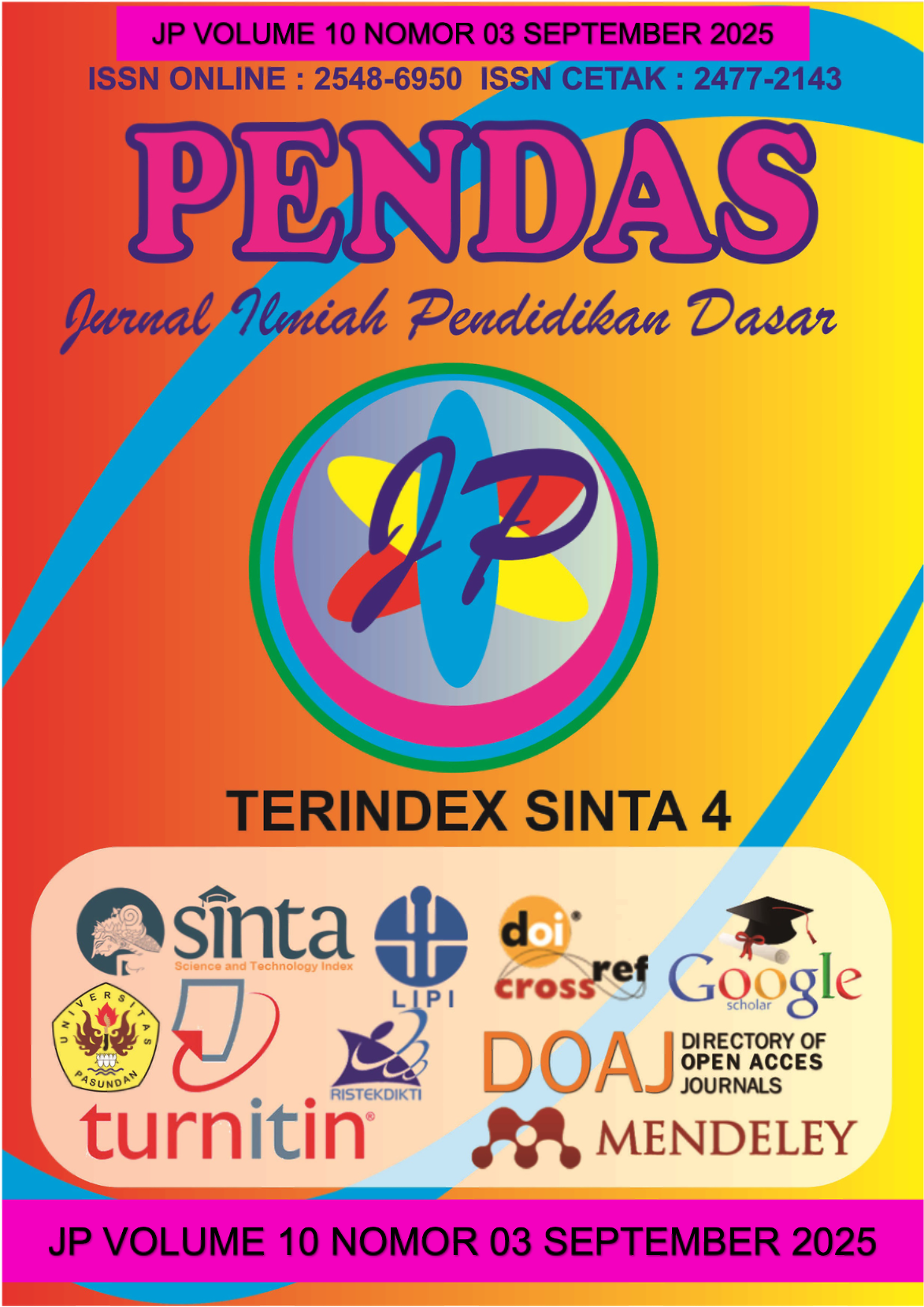PENGEMBANGAN NILAI KEDISIPLINAN KUDA KENCAK UNTUK MENGURANGI DISONANSI KOGNITIF SISWA MTs NAHDLATUTH THALABAH
DOI:
https://doi.org/10.23969/jp.v10i03.32669Keywords:
cognitive dissonance; kuda kencak values; cultural valuesAbstract
This study aims to develop educational media or a guidance service module that integrates cultural values, particularly the value of discipline embedded in the kuda kencak tradition, to reduce cognitive dissonance among students at MTs Nahdlatuth Thalabah. Cognitive dissonance refers to a psychological condition characterized by discomfort resulting from a conflict between beliefs and behaviors or between two contradictory beliefs. In the educational context, such dissonance may occur when students or educators encounter inconsistencies between their personal beliefs and newly acquired information, potentially affecting motivation and learning outcomes. The research employs a research and development (R&D) methodology using a mixed-method approach that combines qualitative and quantitative techniques. The qualitative approach is used to explore and implement the cultural values of kuda kencak as part of character education, with a focus on promoting discipline. These values are expected to help students address internal conflicts arising from contradictory beliefs or behaviors. Meanwhile, the quantitative analysis indicates a statistically significant difference between pre-test and post-test results, with a p-value of 0,03125. The findings suggest that the guidance module based on the disciplinary values of kuda kencak culture is effective in reducing students' cognitive dissonance, enhancing emotional balance, and strengthening their personal beliefs.
Downloads
References
Agustina, R. E., Sari, N. P., & Sugianto, A. (2021). PENGEMBANGAN MODUL PENDIDIKAN KARAKTER DISIPLIN BERBASIS NILAI BUDAYA BANJAR WAJA SAMPAI KAPUTING DI SMP NEGERI 27 BANJARMASIN. JURNAL PELAYANAN BIMBINGAN DAN KONSELING. https://doi.org/https://doi.org/10.20527/jpbk.2021.4.4.4281
Arifa, L. N. (2023). Tiktok and the Deviation of Student Behavior in the Perspective of Ahmad Baradja’s Thought. Islamic Review: Jurnal Riset Dan Kajian Keislaman, 12(1).
Azis, R., Abbas, A., Anshori, M. Z. Al, & Yasin, M. (2025). Dampak Kebiasaan Berkata Kasar Pada Santri Pondok Pesantren Tahfidzul Qur’an Waadissalam Kabupaten Gowa. JIIC: JURNAL INTELEK INSAN CENDIKIA, 02(2).
Azizah, N. Z., Niswatin, S., & Wijayanti, D. T. (2024). Analisis Ritual “Dhemar Kambheng” Sebagai Representasi Spiritual Budaya Etnis Madura di Desa Grujugan Lor. Titian: Jurnal Ilmu Humaniora, 08(1).
Belanche, D., Casaló, L. V, Flavián, M., & Ibáñez-Sánchez, S. (2021). Understanding influencer marketing: The role of congruence between influencers, products and consumers. Journal of Business Research, 132, 186–195. https://doi.org/10.1016/j.jbusres.2021.03.067
Bulatanias, R., & Nuralim, M. (2023). Dinamika Perilaku Ghasab di Pesantren. Jurnal Al-Nadhair, 2(1), 1–12. https://doi.org/10.61433/alnadhair.v2i1.21
Festinger, L. (1957). A Theory of Cognitive Dissonance. Stanford University Press. https://doi.org/doi:10.1515/9781503620766
Hotimah, H., Isriyah, M., & Rahmawati, W. (2025). Pengembangan Nilai Nilai Adat Nyuguh untuk Mereduksi Perilaku Narsistik Pada Siswa Smp Negeri 8 Jember. Guidance : Jurnal Bimbingan Dan Konseling, 22(1), 22–30. https://www.jurnal.uia.ac.id/index.php/guidance/article/view/4572
Husnah, F. R. R., Isriyah, M., & Rahmawati, W. K. (2025). DEVELOPMENT OF A LEARNING MODULE BASED ON REMO DANCE VALUES TO OVERCOME IDENTITY CRISIS AMONG FEMALE STUDENTS AT IBNU KATSIR ISLAMIC BOARDING SCHOOL JEMBER. JURNAL BIKOTETIK (Bimbingan Dan Konseling: Teori Dan Praktik).
Hyndman, R. J., & Athanasopoulos, G. (2023). Forecasting: Principles and Practice (3rd ed.). OTexts. https://otexts.com/fpp3/
Juliani, A., Karmilasari, K., Agustiani, T., Mulyanah, D., & Windiyani, T. (2024). IMPLEMENTASI PEMBELAJARAN BERBASIS BUDAYA TERHADAP KARAKTER PESERTA DIDIK SEKOLAH DASAR. Jurnal Pendidikan Dasar, 15(1), 144–169. https://doi.org/10.21009/jpd.v15i1.43245
Kim, M., Cho, E., & Kim, S. (2023). Going beyond boundaries: A collaborative autoethnographic study of three teachers’ negotiation of cognitive/emotional dissonances. Language Teaching Research. https://doi.org/10.1177/13621688231195317
Maharani, S. T., & Muhtar, T. (2022). Implementasi Pembelajaran Berbasis Kearifan Lokal untuk Meningkatkan Karakter Siswa. Jurnal Basicedu, 6(4), 5961–5968. https://doi.org/10.31004/basicedu.v6i4.3148
Mamnun, A., Sendratari, L. P., & Margi, I. K. (2020). Fenomena Membolos Sekolah Di Madrasah Aliyah At-Taufiq Sigaraja Sebagai Bentuk Perilaku Menyimpang dan Potensinya Sebagai Sumber Belajar Sosiologi di SMA. Jurnal Pendidikan Sosiologi Undiksha, 2(1), 13–21. https://doi.org/10.23887/jpsu.v2i1.28045
Rahmawati, R. (2021). Penerapan Punishment Pendidikan terhadap Pelanggaran Kedisiplinan Siswa Sekolah Dasar. Jurnal Konsepsi, 9(4), 198–208. https://p3i.my.id/index.php/konsepsi/article/view/76
Seran, C. E., Tan, M. J. T., Karim, H. A., & AlDahoul, N. (2025). A conceptual exploration of generative AI-induced cognitive dissonance and its emergence in university-level academic writing. Frontiers in Artificial Intelligence, 8. https://doi.org/10.3389/frai.2025.1573368
Shelley, J., Dawson, E. A., Boddy, L. M., Stewart, C. E., Frost, F., Nazareth, D., Walshaw, M. J., & Knowles, Z. R. (2022). Developing an ecological approach to physical activity promotion in adults with Cystic fibrosis. PLOS ONE, 17(8), e0272355. https://doi.org/10.1371/journal.pone.0272355
Simbolon, M., Pertiwi, Y. W., & Febrieta, D. (2023). Pengasuhan Sebagai Prediktor Perilaku Menyimpang Pada Remaja. KHIDMAT SOSIAL: Journal of Social Work and Social Services, 04(2), 104–110.
Sugiyono. (2023). Metode Penelitian Studi Kasus (Pendekatan Kuantitatif, Kualitatif, & Kombinasi (Vol. 1). Alfabeta.
Vykopalová, H. (2025). Prevalence of
Downloads
Published
Issue
Section
License
Copyright (c) 2025 Pendas : Jurnal Ilmiah Pendidikan Dasar

This work is licensed under a Creative Commons Attribution 4.0 International License.














































